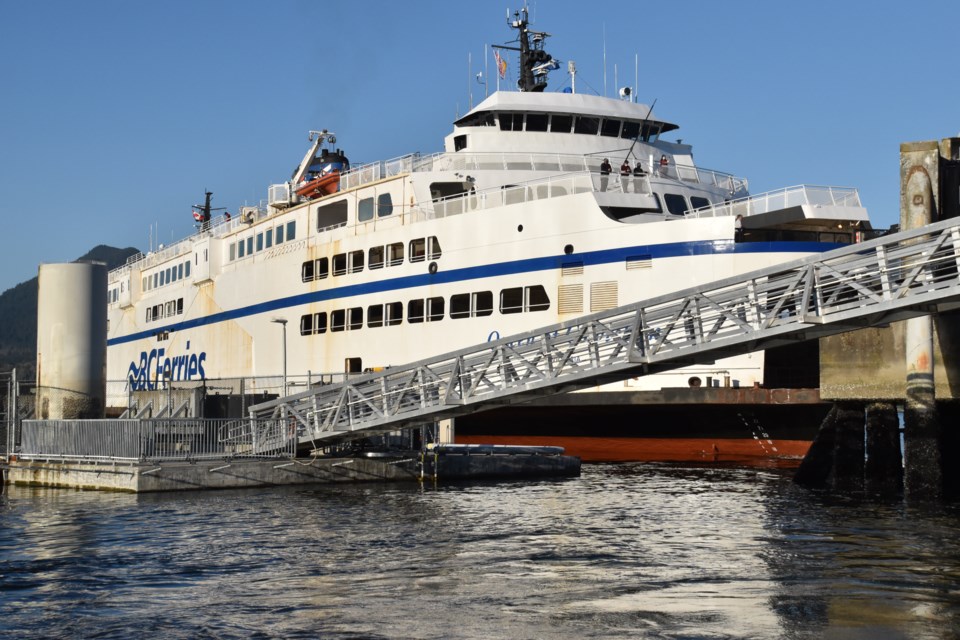Michael Richards never thought he’d work anywhere other than with BC Ferries for the rest of his working life after he started in 2015.
“That was my career job,” said Richards, who was one of about 155 workers who were put on leave without pay by the corporation in late 2021 when Ottawa announced full COVID-19 vaccine mandates for all public servants across Canada.
“There were no plans to do anything else in my life, living in Nanaimo. It was a pensionable job; the benefits were good and all that. No one had any plans of leaving.”
Richards and a number of former BC Ferries workers are now accusing the corporation of dismissing many of the 155 employees on leave outright in July 21 – after Transport Canada suspended its vaccine requirements for sector employees one month earlier.
At that time, BC Ferries began the process of bringing back workers put on leave – but also noted that employees who did not decide definitively to return by July 12 would not only lose their jobs but also lose any rights to compensation because they were deemed to have relinquished their posts by choice.
“On July 21, letters were issued to those who did not meet the July 12 deadline that BC Ferries had no alternative but to conclude that the individual had relinquished their employment with the company as consistent with the collective agreement that states ‘an employee who fails to report to duty for 12 consecutive days without informing the employer of a justifiable reason for his/her absence shall be presumed to have abandoned his/her position’, and employment is terminated immediately,” a statement from BC Ferries said.
“If a former employee wishes to come back, the company will evaluate the request on a case-by-case basis,” the statement continued. “Approximately 120 employees have either returned to work or have let the company that know they intend to return to work.”
Richards is among the 30 or so workers who were terminated. He noted that many of theses workers – when they were put on leave last October – had to move away from their BC Ferries post cities to earn a living or accommodate other family needs. Almost all would like to return to work for BC Ferries, he added – but they wanted the company to address items such as help with moving cost back to their previous post cities, the status of their pensions and the stability of their future employment.
None of those issues were ever addressed in communication between workers and BC Ferries between last October and this July, Richards said. He himself had left Nanaimo and moved to Vancouver to live with his girlfriend during that time, and he noted the cost of moving back – for him and others – is not trivial.
“For nine months, there was no communication – not a pin drop – from them like, you know, ‘just hang in there and we are working to get you back on the job,’” Richards said. “... When they did reach out on June 20, they just said to come back – but, just so you know, the mandates could come back next week and we’ll have to do this all over again.
“We still had grievances that haven’t been resolved. What’s the legality of leave without pay? We never got any back pay. We never got any EI benefits. We had a lot of questions... And if I move back to Nanaimo, that’s going to cost me thousands of dollars without any job security.”
The BC Ferry & Marine Workers’ Union has an arbitration scheduled in October to resolve the outstanding dispute between BC Ferries and its workers stemming from leave without pay.
In the meantime, BC Ferries has ironically run into major staff shortages this summer as travel demand ramps up again and COVID restrictions are lifted. On Aug. 18, the company announced its highest level in vehicle traffic for the first three months of 2022 – up 42% from the same period last year.
The demand has collided with acute staffing shortages at BC Ferries, forcing a significant number of service disruptions across the company’s route network in the last few months. On July 22, BC Ferries made a surprise move, firing CEO Mark Collins effective immediately while naming Jill Sharland as interim president and CEO.
In a statement, BC Ferry Service Board chair Joy MacPhail acknowledged the service interruptions played a role in the corporation’s move among executive ranks.
“There are no quick fixes to these systemic challenges but as a board, we believe it is time for renewal, fresh ideas and a renewed commitment to the highest standards of customer service, safety and affordability,” MacPhail said at the time.
For Richards, the knowledge that there are workers ready to work immediately waiting on the sidelines while staffing shortages are severe enough to cancel some sailings is astonishing.
“I’m absolutely blown away,” he said. “It really puts a sour taste in your mouth, when you see the staffing shortages and they don’t even try to accommodate you to get back to your job to help in any way. It just turned into a complete mess.”



